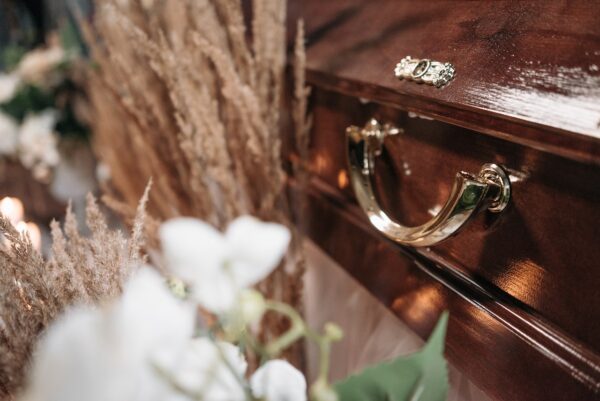Black-owned funeral homes were already struggling for decades long before the COVID-19 pandemic. Until a recent shift, the rate of Black Americans dying from COVID-19 was two times higher than for white Americans, according to the Centers for Disease Control and Prevention. Now, according to data analyzed by The Washington Post, as of mid-October 2021, the death rate for whites has eclipsed that of other groups, with the exception of during the surge of the Omicron variant.

In some cases, generations of Black families use the same funeral parlor for home-going celebrations. There were 3,000 Black-owned funeral homes across the U.S. in 1953, per The Houston Chronicle. That number by 2020 reportedly dwindled to 1,200.
Many Black-owned funeral homes service low-income communities, turning low profits. Families without insurance and individuals with poor credit struggle to obtain adequate finances to cover burial costs. To help, funeral directors sometimes offer price adjustments, payment plans or assistance through fundraisers and/or local churches.
The shift can be seen through individuals like Macy Hall Jr. Hall Jr. went to medical school instead of running his father’s funeral business. He enjoyed hanging at Halls Brothers Funeral Home, which was owned by his father, Macy Hall, and uncle Ocy Hall.
Hall Jr. moved from polishing rails as a child to driving the company hearse during funerals as an adult. But his professional education led him to become a plastic surgeon.
“The business wasn’t for me,” he told The Washington Post. “Too dead.”
Halls Brothers Funeral Home closed in June 2019 after nearly 80 years of burying Black Washingtonians. Owners shut the doors to its headquarters on Florida Avenue, which was founded by uncles of Richard Ables in 1941. Records from The Washington Post reveal the property was originally purchased for $10,000.
Several factors were considered before deciding to close the funeral home. As noted, from the 1950s through the 1980s, Hall Brothers performed as many as 140 funerals a year before its closing. it only handled four. The outlet also mentioned that Ables didn’t bother calling a repairman after the furnace gave out.
“I’m sitting in here dying with the business,” he said. “It’s time to go.”
According to several accounts, it is one of D.C.’s few remaining Black-owned funeral homes.
The Family Business
Ables eventually decided to sell the family business started by Macy Hall and Ocy Hall for $2 million. It was a business the family had built over time.
After migrating from Mississippi in the 1930s, the Halls opened one of the last few Black-owned funeral homes. At the time, Black Americans were pushed out of medicine and unskilled jobs, which were given to white Americans, per History.com.
But Ables, 77, took over the company planning a funeral for his brother, William Ables, in 1998. He became funeral director and kept his promise to “keep it going as long as I could and pass it on.”
The process of preparing for a funeral includes embalming the corpse and helping families pick caskets and plots, along with other details. Ables enjoys it all and takes pride in working with the deceased and being able to “put that smile back on their face.”
“It’s an art, man,” said Ables. “We’re practicing an art.”
The company building on Florida Avenue was based in a community neighborhood that looks much different than when Ables grew up as a child. He recalled hanging at the establishment on afternoons and weekends and playing hide and seek with his cousins while there. Now the building is surrounded by condos and warehouses turned into co-working spaces.
The Encroachment of Gentrification
The family began to notice the area changing.
“If we saw a white person, we’d ask, ‘What are you doing here?’ said Ables of the neighborhood then. “Now, it’s the opposite.”
Ables said he tried to lure in new clientele, placing ads catering to Hispanics, Ethiopians and Indians, but there was very little response. Ables doesn’t go into if the funeral home’s failure was due to the business failing to meet the needs of the area’s new residents or if the residents didn’t want to hire a Black funeral home. But what is known is that business dropped drastically.
Since 2000, the funeral home held 446 funerals, or about a quarter of the 1,816 it conducted from 1980 to 1999.
“We got stuck in time,” Ables said.
He grew to enjoy documenting an individual’s final moments at Halls Brothers Funeral Home. He said it’s a privilege “to leave behind a legacy for folks to reflect on.”




